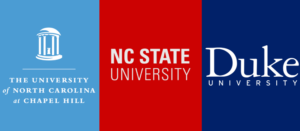Duke University brings in record money from its startups and technology

(Axios Raleigh – Zachery Eanes) — The Triangle’s research universities are setting new revenue records from research and technology created by their students and faculty.
Driving the news: Duke University reported bringing in a massive $102.5 million in licensing and equity payments from technology and startups formed on its campus in its fiscal year 2023, which ended June 30.
- It caps an incredibly consistent run by the university, which has brought in more than $50 million via technology created on the campus for the past five years.
Why it matters: The Triangle university ecosystem — the origin of the Research Triangle moniker — has long been the economic backbone of the region, reliably attracting talent, jobs, and money to the region.
- The startups formed by their faculty and students have gone on to become some of its largest employers, including names like Quintiles, now known as IQVIA (UNC); SAS Institute and Wolfspeed (N.C. State); Precision Biosciences (Duke) and RTI International (all three universities).
State of play: The universities have, over the past decade, become much more focused on turning the intellectual property formed on their campuses into financial windfalls.
- In addition to Duke’s success, UNC broke its licensing and equity record in 2021 (thanks to Bayer’s $4 billion acquisition of Chapel Hill-founded gene therapy company AskBio).
- And since 2015, N.C. State has formed the most startups of any school in the area.
What’s happening: Duke can attribute its success to a hot streak of drugs entering the market as well as startups filing for initial public offerings or being acquired, according to Robin Rasor, the school’s associate vice president of translation and commercialization.
- In its past fiscal year, five Duke-related startups were acquired, including Durham-based Isolere Bio and InnAVasc Medical.
- The school has also seen six different IPOs in the past five years, which has provided a reliable stream of equity payments.
- Duke Capital Partners, the university’s early-stage investment firm, has also become more active in supporting young startups with capital, including investing $10.8 million into 12 startups in fiscal year 2023.
What they’re saying: Rasor, who has worked at universities for three decades, said there’s been a big shift within schools in recent years.
- Younger faculty are more interested in forming companies, she said, and universities are providing more infrastructure for them to do so.
- “Most of the [faculty] recruits coming in are already innovators … and they’re very interested in what the [startup] environment is going to be like,” Rasor told Axios. “That’s a big change, and … it’s important to have that kind of environment so we can recruit the best and the brightest.”
What we’re watching: Of the 15 startups formed at Duke in the past year, 66% are headquartered in North Carolina.
- That’s a decline from previous years, according to Rasor, who said remote work trends may be leading to more of the university’s startups to relocate — even as more Duke students seem to be staying in the area after graduation.
- She said the Triangle’s critical mass of talent continues to improve but many startups still weigh whether Boston or the Bay Area might be a better fit.
